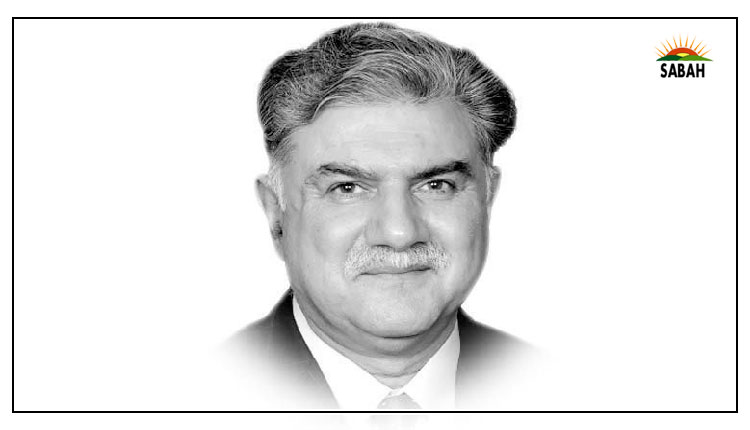Sino-US rivalry…Inam Ul Haque
It was in 2003 when Fareed Zakaria, the eminent Indian American analyst better known for his CNN programme Fareed Zakaria GPS, wrote The Arrogant Empire in the March 23 issue of Newsweek magazine. It was just before the US invasion of Iraq to remove Saddam Hussein. In the grim mood of the times, America was virtually alone, launching war in relative isolation with many allies firmly opposed to its policies. Under the cacophony of noises about some kind of turning point in the global power alignment, Western Alliance, European unity and the UN were perceived cracking under stress, and Americas role in the new world order was debatable.
Lack of global support for the US war in Iraq was attributed to a pacifist Europe living in a postmodern paradise, protected against threats, hence unable to imagine military action. Citing deep chasm between the State and the Street, and the widening mistrust and resentment against the US foreign policy, Mr Zakaria echoing the Bush Administrations argument justified the war calling the invasion a justifiable use of military force, arguing this war will look better when it is over. Exalting the National Power Potential (NPP), especially its military power, he fact-checked that the US military spending (2003-04) was roughly equal to all 191 countries put together, yet a meagre 4 per cent of the US GDP.
Combining the US Military strength with economic power, youthful demography and technological innovation, he attributed American NPP to most of all its non-imperialist (and ironically liberating) credentials for just causes in wars. But he cautioned the US, quoting an English satirist John Dryden, who said, When the chosen people grew too strongthe rightful cause at length became the wrong.
Zakaria attributed Americas postwar rise to the generosity of its spirit, treating allies with dignity and respect, without rubbing favours in their faces. He made the case citing a near crippled Franklin Roosevelt (FDR) at the zenith of his power, going halfway across the globe (Tehran and Yalta) to greet Churchill and Stalin, when he could conveniently send his deputies, George Marshall and Eisenhower etc, or call those leaders to the US. FDR let the glory in war go to British commanders like Montgomery. He ensured equitable representation in the world order by bringing the then poor peasant China (ROC) into the UNSC. And he let the Europeans decide how to spend money under the Marshall Plan, rather than the US dictating it.
All that changed under George Bush (2001-08) when he withdrew from international commitments and treaties, reneged on almost every diplomatic effort displaying streaks of isolationism. And when 9/11 mobilized the US power but narrowed its interests, America was determined to act, but act unilaterally (and even pre-emptively) to protect its core interests. And so, the infatuation with principles and the generosity of spirit died.
Zakaria returns to his favourite study of the US power potential, comparing it to a rising China in the Jan-Feb 2024 issue of Foreign Affairs magazine calling the US: The Self-Doubting Superpower. Yet he makes the case for continued US leadership under altered power-dynamics, where powers like China, Russia and India, etc no longer follow the US diktat. Yet he assuresit need not be a cause for panic and self-doubt by Washington.
The debate whether the contemporary world is unipolar or bi/multipolar has takers on all sides. Applying the Hans Morgenthau methodology the gap in comparative NPP of top contenders Zakaria considers the world bipolarthe US and China. However, China suffers from demographic weakness (overpopulation, effects of one-child policy, aging population); lack of alliances; its lighter presence in the Middle East; comparatively subdued power to influence others; and Chinas nagging trouble spots (Spratly Islands, Tibet, Turkestan, human rights, etc). China also lacks the experience and exposure of acting big, unlike the US, which perfected this through multicultural pluralism. While the US can draw from a pool of multicultural citizenry to deal with issues and global flashpoints (Zalmay Khalilzad, John Abizaid, etc), China deals with the world through its ubiquitous Han-dominated officialdom. And it is slowly transitioning from a hesitant regional power to a more assertive superpower.
Mr Zakaria dilates on the difference between power and influence, power being hard and influence more amorphous, less tangible, and subtle. Whereas the US has both, in case of China influence trails its power. Comparison of the alliances and treaty relationship, tilted in favour of the US, is instructive. Alongside the broader Sino-US competition, there are medium powers like Brazil, Indonesia and India, for example searching for their distinctive strategies. He calls Modis India following multi-alignment strategybenefiting from all sides.
For the US, pivot to Asia was pivot away from the Middle East, where the US had over-invested militarily. However, the course of war in Gaza seems to have applied brakes to the US leaving the Middle East anytime soon. The cumulative effect of the USs Middle East policies was not a happy balance of power, that the world was more familiar with, but rather a vacuum, which is being filled by revisionist powers like Iran. And that compels other regional players to cooperate with its nemesis Israel, hence the Abrahamic Accords. Mute response to Gaza by Sunni Muslim stalwarts is best explained by Hamass patronage by Iran alongside Houthis of Yemen. Aligning with the West Plus having a whopping 60% global military spending makes sense for Arab rulers and others.
The prospect of Sino-US conflict is interesting. Although in analysis after analysis, think-tanks are persistently arguing about such conflicts likelihood, one tends to disagree. It is China that is likely to blink first, as global status quo is protective of its core interests. As it is not a spoiler state like Russia, it is not likely to upend a system through which it has reached the present pinnacle of its power and prestige. Although butterfly movements cannot be ruled out, starting a shooting war due to miscalculation and miscommunication, it is highly unlikely. President Xi recently abandoned the lone-wolf diplomacy, and loudly asked the US to lift sanctions, especially on technology transfer, during the Xi-Biden summit last year.
In sum, right now there is no alternative to the US power. However, America also must practise a rule-based world rather than preaching itand the genocide of children in Gaza is a gaping wound, pregnant with uncertainties, beyond human ability to fathom. I keep my fingers crossed, and so should Mr Zakaria!
Courtesy The Express Tribune












